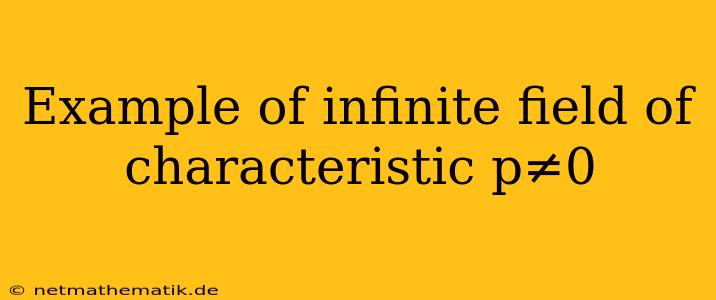The realm of abstract algebra offers a vast landscape of mathematical structures, among which fields stand out as fundamental objects. Fields, characterized by their algebraic properties, provide the bedrock for many areas of mathematics, including number theory, algebraic geometry, and cryptography. Within this framework, the concept of characteristic plays a crucial role in classifying and understanding fields. A field's characteristic reveals deep insights into its structure and behavior, leading to a rich tapestry of theoretical exploration. In this discourse, we delve into the intriguing world of fields with non-zero characteristic, specifically focusing on the concept of Example of infinite field of characteristic p≠0.
What is a Field of Characteristic p≠0?
Before delving into the specifics of infinite fields of non-zero characteristic, let's establish a foundational understanding of what these concepts entail.
Field: A field is a set equipped with two operations, addition (+) and multiplication (*), satisfying certain axioms. These axioms ensure that the field behaves in a predictable and consistent manner, allowing us to perform arithmetic operations within its framework. Examples of familiar fields include the set of rational numbers (Q), the set of real numbers (R), and the set of complex numbers (C).
Characteristic: The characteristic of a field is a fundamental property that captures the essence of how repeated addition within the field behaves. It is defined as the smallest positive integer n for which adding n ones results in zero, i.e., 1 + 1 + ... + 1 (n times) = 0. If no such integer exists, the characteristic is said to be zero.
Field of Characteristic p≠0: A field of characteristic p≠0 is a field where the smallest positive integer for which adding p ones results in zero is a prime number p.
For instance, the field of integers modulo p, denoted by Z<sub>p</sub>, is a prime field of characteristic p. This field consists of the elements {0, 1, 2, ..., p-1}, where addition and multiplication are performed modulo p.
Constructing Infinite Fields of Characteristic p≠0
The existence of infinite fields with non-zero characteristic might seem counterintuitive at first. After all, if repeatedly adding 1 to itself p times results in zero, wouldn't this imply a finite structure? The key lies in understanding that the field of characteristic p does not necessarily consist only of elements obtained by repeatedly adding 1.
One way to construct such fields is by considering polynomial rings over finite fields.
Polynomial Ring: A polynomial ring is a set of polynomials where the coefficients belong to a base field. We denote the polynomial ring over a field F by F[x].
Construction: Let F be a finite field of characteristic p. Consider the polynomial ring F[x], which comprises polynomials with coefficients in F. Now, we can form a quotient ring by taking the polynomial ring and dividing it by an ideal generated by an irreducible polynomial f(x). This quotient ring, denoted as F[x] / <f(x)>, forms a field of characteristic p.
Example:
-
Consider the field Z<sub>2</sub>, the field of integers modulo 2. It contains the elements {0, 1} and has characteristic 2.
-
Take the polynomial ring Z<sub>2</sub>[x] and choose an irreducible polynomial, for example, f(x) = x<sup>2</sup> + x + 1. This polynomial is irreducible over Z<sub>2</sub> because it has no roots in Z<sub>2</sub>.
-
Construct the quotient ring Z<sub>2</sub>[x] / <f(x)>. This quotient ring consists of polynomials of the form a + bx, where a and b belong to Z<sub>2</sub>, subject to the relation x<sup>2</sup> + x + 1 = 0. In essence, we are replacing x<sup>2</sup> with -x - 1 in all polynomial expressions.
-
The quotient ring Z<sub>2</sub>[x] / <f(x)> is an infinite field of characteristic 2. This field is often denoted by GF(2<sup>2</sup>) and is called the Galois field of order 4.
Importance of Infinite Fields of Characteristic p≠0
The existence of infinite fields of characteristic p≠0 has significant implications in various branches of mathematics and computer science:
-
Algebraic Geometry: These fields are essential for studying algebraic curves and varieties over finite fields. For instance, elliptic curves over finite fields are used in cryptography and coding theory.
-
Coding Theory: Linear codes, which are widely used for error correction, are often defined over finite fields of characteristic p≠0. The algebraic structure of these fields enables efficient encoding and decoding algorithms.
-
Number Theory: Certain problems in number theory, such as the study of Fermat's Little Theorem and its generalizations, can be effectively approached using fields of characteristic p≠0.
-
Computer Science: Fields of characteristic p≠0 are fundamental in finite field arithmetic, which plays a crucial role in cryptography, data compression, and error-correcting codes.
Conclusion
The concept of Example of infinite field of characteristic p≠0 reveals the richness and depth of abstract algebra. While seemingly counterintuitive, infinite fields with non-zero characteristic exist and play pivotal roles in diverse areas of mathematics and computer science. From the construction of these fields using polynomial rings to their applications in coding theory and cryptography, their study unveils the interconnectedness and profound nature of mathematical structures. The exploration of fields with non-zero characteristic continues to fuel groundbreaking research and push the boundaries of our understanding of these fundamental algebraic objects.
